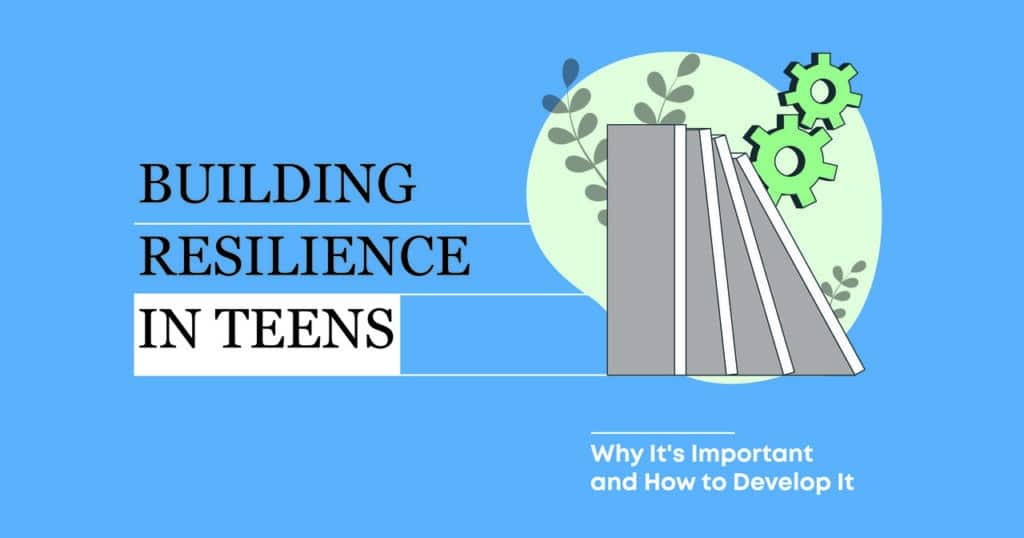The life of the teenager is similar to that of a roller coaster at an amusement park: at one moment, you may feel on top of the world, but at another time, it could all come crashing down with disappointments, stressors, or worries that seem too much to handle. Regardless of what the pressure is in academics, be it friendship, family, or general going on in adolescence teenagers have to handle all that. Thus building resilience becomes very crucial.
Essential Takeaways
- Life skill resilience. Developing resilience in the teenage years makes the individual prepared for multiple challenges arising from academics, personal, to professional levels.
- Importance of support systems. Support systems such as friends, family, teachers, and mentors provide the emotional resources required by teenagers to face challenges head-on and achieve resilience.
- Attitude is everything. Cultivating a growth mindset and beneficial self-talk enables adolescents to turn the negative aspects into growing experiences, thus increasing the teen’s ability to overcome adversity in the long run.
Resilience isn’t about avoiding problems; it is about bouncing back from them. It is a skill that helps teens carry themselves into the battle with confidence to thrash out the troubles of life, and the good news is that resilience can be developed. Let’s jump in and explore why you want to cultivate resilience in a teen and how you can help.
What Is Resilience?
Defining Resilience in Teens
Let’s begin from scratch, what is resilience? Resilience refers to the idea of bouncing forward from setbacks, facing a situation head-on, and the grit to keep going even when things get rough. It’s like emotional strength that lets you recover after a terrible day, a failed test, or an argument with a friend.
Resilience for teens means coping with regular stressors in life without getting overwhelmed. Whether it is the pressure of school, relationship conflicts, or disappointments, resilient teens learn to adjust, find ways around a problem, and look at life on the bright side. They are not defined by setbacks or obstructions to their next moves.
Why Is Resilience Important for Teenagers?
Developmental Resilience Adolescence is the critical time when youngsters begin to undergo greater challenges academically, socially, and psychologically. First failures, rejections, or disappointments may happen at this stage of a teenager’s life. Without resilience, these experiences could be too much for a teen’s confidence and their mental health.
It prepares teens for life’s setbacks. It teaches them that challenges are what life is about and that if a child faces them with the right mindset, they will be able to get through those tough times and come out stronger on the other side. Building resilience now would equip them to do well later in life because they will better be able to navigate the peaks and troughs of adulthood.
Benefits of Resilience in Teens
Emotional Well-being and Mental Health
Resilience is also significantly tied to emotional well-being. A resilient adolescent is likely not to suffer long-term anxiety, depression, or hopelessness in the face of adversity. He develops an ability to cope with his emotions and thought processes rather than letting his emotions overwhelm him.
Through resilience, teenagers can learn to calm down their emotions and not take things personally, no matter how hard things get. They learn the insight that setbacks will not define them, and that difficult feelings are always transient. Such an outlook helps stop emotional problems from getting out of control, thus providing an opportunity for teens to stay in control of things and remain optimistic.
Improved Problem Solving and Decision Making
One of the greatest strengths that resilience brings is improved problem-solving skills. Resilient teens are generally better at meeting problems rather than avoiding them. They develop the ability to assess situations objectively and understand that a given situation may have various solutions. The teen can, therefore, think critically and make confident decisions.
For example, if a resilient teenager does not pass the test, he or she will not give up immediately. He or she can evaluate what was done wrong, for example, perhaps did not study hard or did not learn well and learn how to do it correctly next time. Such a problem-solving mentality is invaluable in school and generally in life.
Building Stronger Relationships
Resilience also has a big impact on the way teens cope with their relationship issues. Is it the effort to deal with some kind of misunderstanding or conflict with a friend, trying hard to resist pressure from peers or managing conflicts with family? Emotionally resilient teens can cope better with interpersonal challenges.
Resilience allows teens to express themselves in a way that in no time solves their boundaries and disputes without any emotions getting the better of them. This leads to healthier and stronger relationships, which help during emotional states of distress.
Common Challenges Teens Face Today
Academic Pressure and Performance Expectations
Schools can be a great source of main stressors for the teen, the expectations to get good grades, meet deadlines, and do well on all their exams. This is stressful and overwhelming when these expectations seem so high. Resilience teaches teens that a setback, low grade, or failed test is part of the learning process, not the end of the world.
Rather than considering failure, as futile at achieving the set goals, resilient teenagers learn the skill of reflection on what went wrong and how to seek help if need be and try again. This develops a pattern of thought that will reduce academic-related stress and anxiety created by challenging issues.
Social Media and Peer Pressure
Social media has become huge in the lives of teens, and while it is a great tool for staying connected, it brings its own set of challenges. Teens are constantly exposed to carefully crafted images and highlight reels that make them feel like they do not measure up, which of course only makes them feel bad about themselves and anxious.
It helps them rise above the pressure forces, reminding their teens that social media isn’t life. It teaches teens to value their self-worth rather than comparing themselves to others and focusing more on what matters in life, not just what might look good online.
Family Issues and Personal Struggles
Most teenagers are facing problems inside their homes, and some are fighting with parents, divorce, financial stress, and so on. Resilience will help them in coping with difficult situations, hence giving tools to enhance effective management of emotions and find constructive methods to cope with circumstances.
While the teens cannot necessarily dictate what happens within their homes, resilience gives them the strength to control their response. It allows them to seek help, maintain hope, and keep themselves busy with whatever aspects they can have control over, despite the difficult circumstances.
Managing Rejection and Failure
No one escapes rejection and failure as a part of life sooner or later. Teens will get their share of them, whether it be not making the sports team, being turned down for a job, or going through a breakup. Resilience teaches teens that these experiences, though painful, do not define them.
Resilience is when teens instead of letting these failures or rejections knock them off their feet spring back, get up, and try again. Instead of perceiving the experiences as personal failures, they see them as occasions to grow.
Building Resilience in Teens
Creating Growth Mindset
A mindset that thinks abilities and intelligence can be grown through effort, learning, and persistence is one of the most powerful ways to build resilience. In a growth mindset, teens see challenges as opportunities to grow and develop; they don’t use them as a reflection of their abilities.
Teach teens to accept failure and frustration as part of learning. If a growth mindset says, “I am not good at math,” then what a growth mindset says is, “I’m still learning, and I will get better with practice.” This mindset change helps teens approach challenges with optimism and resiliency.
Promoting Positive Self-Talk
The way teens talk to themselves matters. If they repeat negative self-talk-such as “I am not good enough” or “I will never make it,” then the easier road may become almost impossible to take. Encouraging teens to think positively, and affirming the good in themselves and their lives, is where resilience begins.
Encourage young teens to have positive self-talk: Remind them to be aware of the regions where they are potent or where they can do better and thereby exert an effort. Replace thoughts that say, “I always mess up,” with phrases such as, “I am doing my best, and I will do better.” This is a way to build resilience since it keeps reassuring them that they will be able to cope with anything.
Teens Support Systems
No one needs to go through some of the difficulties alone, and proper support is mostly what would make the most difference in the building of resilience. Help the teenager build a supportive network of friends, family members, teachers, and mentors who guide them when things get tough, encourage them as they move along, and provide them with an ear to listen when things go wrong.
Whenever adolescents believe that people will be there for them, they are willing to take risks that are essentially required to explore and learn by falling and getting back up again since they have confidence in something to fall back on. Remind them that seeking help is a strength, not a weakness.
Teaching Problem-Solving and Coping Skills
Resilience is not only about bouncing back; it is also about learning methods that help to solve problems, deal with stress, and generally improve well-being. Teach teens practical problem-solving skills, such as breaking big problems down into steps or brainstorming various solutions.
The teen can cope with the emotions that make them overwhelmed by using coping skills such as deep breathing, mindfulness, or journaling. These tools give the teens control and empower them to face different challenges with confidence.
Promotion of Healthy Risk-Taking
Taking healthy risks is scary, but it’s an amazing way to create resilience. Train your teen to take healthy risks by trying new things, whether that be trying out for the sports team, joining a club, or speaking up in class. This might not work out all the time, but going through the experience of taking a healthy risk builds confidence and resilience.
When teens understand that failing won’t hurt the world, it readies them to take on risks and go further without any possibility of being crushed by roadblocks along the way, which is how long-lasting resilience is built.
The Role of Parents and Educators in Building Resilience
Creating a Safe, Supportive Environment
Key players in the support of resilience development among teens are parents and educators. First, at their core, they need to develop a space for youths where they can freely feel, make mistakes, and take risks.
The safety net also shows that teens with that information feel secure enough to have a go at more difficult stuff. Encourage them, be patient with them, and remind them it’s all right to fail so long as they keep trying.
Modeling Resilience
It is also through example that teens learn how to be resilient. Thus, parents and teachers also need to demonstrate resilience in their daily lives. Teach teens to approach problems or failures with a good attitude, persistence, and coping strategies. When teen learners see adults in their environment facing failures and not giving up, they will likely develop those same behaviors. Support and Independence
While it is necessary to support teenagers, it is equally important to give them space and independence to solve problems on their own because too much may prevent teens from learning how to solve problems. Too little support brings about the feeling of being overwhelmed.
Balance gives them guidance and encouragement by allowing teens to take ownership of their problems and solutions. This approach helps build confidence and resilience by demonstrating to teens that they can handle life’s challenges.
Strategies for Teens to Practice Resilience Each Day
Daily Journaling and Reflection
This will allow teens to reflect on their experiences, process their emotions, and track their progress. Request your teen to write about the challenges he has faced and how he managed to overcome them. It helps teenagers realize their strengths and develop confidence in bouncing back.
Setting Realistic Goals
Target: Setting and Attaining Small, Achievable Goals; Encourage setting small, achievable goals. Encourage teens to break big tasks into smaller manageable steps. Every time they achieve a goal no matter how small it will build their confidence and reinforce their ability to take on bigger challenges.
Practice Gratitude
These can inspire teenagers to stay hopeful even in trying times. Encourage them to practice gratitude by writing down at least three things they are thankful for each day or reflecting on the positive aspects of their life when they feel stressed. This simple habit can shift their focus away from problems toward good things in life.
Mindfulness and Relaxation Techniques
Mindfulness practices like meditation, deep breathing, yoga, or some other can keep teens focused while keeping them calm. These practices direct the attention of teens toward the present time and away from what is yet to come or after the passing times. Mindfulness becomes a part of a teen’s everyday life, which helps him or her build emotional resilience as he or she navigates through overwhelming emotions.
Learning From Failures
Finally, challenge teens to look upon failures and setbacks as experiences that will help them grow. When the challenge is finished or a failure has occurred, ask them how they have learned from it and how they might be able to apply their learnings in the future. This helps teens shift attention not from the setback itself but from the growth that follows afterward.
Why Resilience Matters in the Long Run?
Preparing Teens for Adulthood
Resilience is not about hurding through adolescence but preparing teens to face life in all of its forms. Now, after all of us have been presented with conditions where aspects of our lives put us in adversity, it is those who are resilient who can handle it much better. But it is in their ability to cope with challenges at work, self-created problems, or relationships that make the building of a resilient capacity the right kind of lifelong skill for youth.
Promotion of a Positive, Adaptive Perspective
Resilience teaches teens to appreciate change, find opportunities during adversity, and adapt to new circumstances. Such a positive, adaptive mentality is important for success in an ever-changing world. Resilient people don’t just survive challenges-they thrive despite them.
Building Strong Mental and Emotional Well-Being
The bottom line: Resilience will play a huge role in your protection from mental and emotional illness. Teens possessing resilience can better control their stress, calm their anxiety, and stay more balanced and in perspective as things get challenging. Building resilience now lays the foundation for a healthier, happier life.
Building Resilience as a Lifelong Skill
One of the most important tools for teens navigating the hassles and hardships of life is a skill: resilience. A growth mindset, positive self-talk, a good support system, and healthy coping strategies are all building blocks to help teens develop the grit they will need to flourish now and in years to come.
Encourage the Teenager to Take Small Steps
Commit to a realistic goal, practice gratitude, or engage in mindfulness. Share this guide with other parents, educators, and teens, and let’s work together to build a generation of resilient, confident young people ready for whatever the world has in store.
FREQUENTLY ASKED QUESTIONS
- What is resilience, and why does it matter for teens?
Resilience is the capacity to rebound when challenged, thwarted, or failed and keep on with life. For teens, it is very crucial because resilience will help them conquer academic pressure, social challenges, and personal struggles with confidence and emotional strength.
- How do I help my teen build resilience?
Help your teenager build resilience by instilling a growth mindset, positive self-talk, support with encouragement of independence, and problem-solving skills and coping skills. Make the environment comfortable and supportive so that they can learn to take risks and draw lessons from failure.
- What are some common challenges that test a teen’s resilience?
The most common challenges include academic pressure, comparison through social media, pressure from peers, issues within the family, and personal issues such as rejection or failure. Resilience gives them the confidence to face the inevitable obstacle, so they can learn from their experiences.
- How does resilience influence a teenager’s mental health?
Resilience should play a very crucial role in maintaining one’s mental health. Resilient teens cope much better with stress, anxiety, and depression. They also have a higher chance to be optimistic and maintain a balance of emotions while undergoing hard situations.
- Is resilience something you can learn, or are you born with it?
Resilience is not a born ability-it is something that can be learned and developed over time. Within the realm of right support and consistent practice, people can develop resilience from anywhere.




